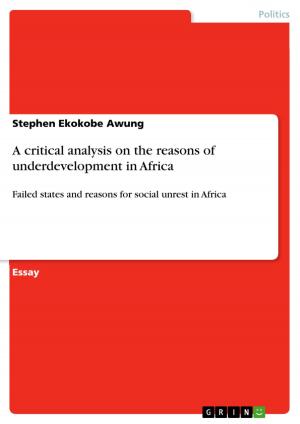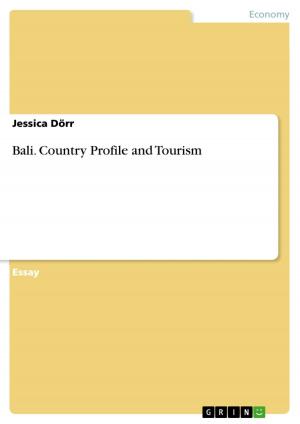Chances and challenges. The consequences for the Baltic states' foreign and security policy after EU and NATO enlargement.
Nonfiction, Social & Cultural Studies, Political Science, International, International Relations| Author: | Christoph Wehr | ISBN: | 9783638299787 |
| Publisher: | GRIN Publishing | Publication: | August 12, 2004 |
| Imprint: | GRIN Publishing | Language: | English |
| Author: | Christoph Wehr |
| ISBN: | 9783638299787 |
| Publisher: | GRIN Publishing |
| Publication: | August 12, 2004 |
| Imprint: | GRIN Publishing |
| Language: | English |
Seminar paper from the year 2004 in the subject Politics - International Politics - Region: Eastern Europe, grade: good, Vilnius University (Institute of International Relations and Political Science), course: Baltic sea region: conflict, cooperation and regionalism, language: English, abstract: Introduction On the 1st of May 2004 the Baltic states Lithuania, Latvia and Estonia will both join the European Union (EU) and the North Atlantic Treaty Organization (NATO). This means a change for the national foreign and security policies. With the former main goals (of EU- and NATO-enlargement) fulfilled, the Baltic states have to face the consequences of their decision for West-integration. There are, of course, chances and opportunities which the new members can grasp. But there are also challenges connected with their membership which must not be underestimated. This article deals with these chances and challenges the EU- and NATO-membership of the Baltic countries is about to bring. Accordingly, the main questions which shall be taken into consideration are: What are the (positive and negative) consequences for the Baltic states' foreign and security policy? How can they take advantage of its West-integration? What are the dangers the new political architecture in the Baltic Sea Region might possibly evoke? In order to discover the chances and challenges for the Baltic states one has to analyze the change within their foreign and security policy. Thus, the second chapter of this article will be about the time directly having followed independence and the discussion about the most important goals and the main orientation of foreign and security policy. Which were the different options the Baltic states could have chosen for their foreign and security policy? The third chapter deals with the already existing paths and institutions of cooperation within the Baltic Sea Region. In this context, especially Russia has to be taken into regard. How are the relations organized between Russia on the one hand, the EU, NATO and the new members on the other hand? After having analyzed the conditions of the Baltic states' foreign and security policy the fourth chapter shall deal with the actual challenges and chances given by EU and NATO enlargement. Therefore, the focus shall lie on Lithuania and its bilateral relations with its neighbor countries. In the east of Lithuania will be the future border of the EU. Which are the specific changes for Lithuania in this context and what can Lithuania do to achieve its goal of being regarded as a worthy member of the Western community?
Seminar paper from the year 2004 in the subject Politics - International Politics - Region: Eastern Europe, grade: good, Vilnius University (Institute of International Relations and Political Science), course: Baltic sea region: conflict, cooperation and regionalism, language: English, abstract: Introduction On the 1st of May 2004 the Baltic states Lithuania, Latvia and Estonia will both join the European Union (EU) and the North Atlantic Treaty Organization (NATO). This means a change for the national foreign and security policies. With the former main goals (of EU- and NATO-enlargement) fulfilled, the Baltic states have to face the consequences of their decision for West-integration. There are, of course, chances and opportunities which the new members can grasp. But there are also challenges connected with their membership which must not be underestimated. This article deals with these chances and challenges the EU- and NATO-membership of the Baltic countries is about to bring. Accordingly, the main questions which shall be taken into consideration are: What are the (positive and negative) consequences for the Baltic states' foreign and security policy? How can they take advantage of its West-integration? What are the dangers the new political architecture in the Baltic Sea Region might possibly evoke? In order to discover the chances and challenges for the Baltic states one has to analyze the change within their foreign and security policy. Thus, the second chapter of this article will be about the time directly having followed independence and the discussion about the most important goals and the main orientation of foreign and security policy. Which were the different options the Baltic states could have chosen for their foreign and security policy? The third chapter deals with the already existing paths and institutions of cooperation within the Baltic Sea Region. In this context, especially Russia has to be taken into regard. How are the relations organized between Russia on the one hand, the EU, NATO and the new members on the other hand? After having analyzed the conditions of the Baltic states' foreign and security policy the fourth chapter shall deal with the actual challenges and chances given by EU and NATO enlargement. Therefore, the focus shall lie on Lithuania and its bilateral relations with its neighbor countries. In the east of Lithuania will be the future border of the EU. Which are the specific changes for Lithuania in this context and what can Lithuania do to achieve its goal of being regarded as a worthy member of the Western community?















